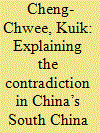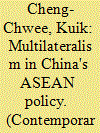|
|
|
Sort Order |
|
|
|
Items / Page
|
|
|
|
|
|
|
| Srl | Item |
| 1 |
ID:
083828


|
|
|
|
|
| Publication |
2008.
|
| Summary/Abstract |
Recent International Relations scholarships and policy publications have used the term hedging as an alternative to "balancing" and "bandwagoning" in describing small states' strategies towards a rising power. In the case of Southeast Asian countries responses to a re-emerging China, more and more analysts have asserted that none of the smaller states are pursuing balancing or bandwagoning in the strict sense of the terms, and that the states are in fact adopting a "middle" position that is best described as "hedging". This paper seeks to assess this assertion by performing three principal tasks. First, it attempts to identify the key defining attributes and functions of hedging as a strategy that is distinguishable from pure forms of balancing and bandwagoning. Second, it aims to operationalize the term within the context of Southeast Asia-China relations, by focusing on the cases of Malaysia and Singapore's response to China in the post-Cold War era. Third and finally, the study explains why these two states have chosen to hedge in the way they do. The central argument of the essay is that the substance of the two smaller states' policies are not determined by their concerns over the growth of China's relative power per se; rather, it is a function of regime legitimation through which the ruling elite seek to capitalize on the dynamics of the rising power for the ultimate goal of justifying their own political authority at home.
|
|
|
|
|
|
|
|
|
|
|
|
|
|
|
|
| 2 |
ID:
152282


|
|
|
|
|
| Summary/Abstract |
China’s South China Sea policy in recent years has been marked by a mix of maritime assertiveness and economic-diplomatic inducement. This article argues that this contradiction is a result of both structural drivers and domestic imperatives. Structurally, the perceived opportunity after the global financial crisis and later, the perceived risk of a US-led encirclement after Obama’s “rebalancing to Asia” strategy have both pushed China to take a more hard-line approach to maritime disputes. However, the necessity to avert regional backlash has, on the other hand, compelled Beijing to counteract its maritime moves with active economic and diplomatic statecraft to reassure its smaller neighbours, albeit with mixed effects. Domestically, the contradiction is rooted in the ruling Communist Party of China elites’ needs to strike a balance between their different pathways of legitimation: while nationalist legitimation necessitates China to assert its sovereign rights, performance legitimation requires it to pursue a cooperative regional strategy via the “Belt and Road Initiative” so as to preserve a stable and productive environment needed for sustained domestic growth.
|
|
|
|
|
|
|
|
|
|
|
|
|
|
|
|
| 3 |
ID:
061419


|
|
|
|
|
| Publication |
Apr 2005.
|
| Summary/Abstract |
This article aims to study the origins and patterns of China’s involvement in regional multilateral institutions, as well as its characteristics and implications for China’s ASEAN policy in the post-Cold War era. To this end, the study focuses on China’s participation in three ASEAN-initiated and -driven multilateral institutions, namely the ASEAN Regional Forum (ARF), ASEAN-China cooperation, and the ASEAN Plus Three (APT) process. The article shows that China’s perceptions and policies toward multilateral institutions have been going through significant changes, from caution and suspicion to optimism and enthusiasm. Instead of perceiving multilateral institutions as malign arrangements that might be used by other states to challenge China’s national sovereignty and to limit its strategic choices, Beijing now views multilateral institutions as useful diplomatic platforms that can be utilized to advance its own foreign policy objectives. Such perceptual changes have slowly but significantly led to a greater emphasis on multilateral diplomacy in China’s ASEAN policy. It can be argued that multilateralism now plays a complementary, rather than a supplementary role to bilateralism in the conduct of Chinese foreign policy towards ASEAN in the new era.
|
|
|
|
|
|
|
|
|
|
|
|
|
|
|
|
|
|
|
|
|